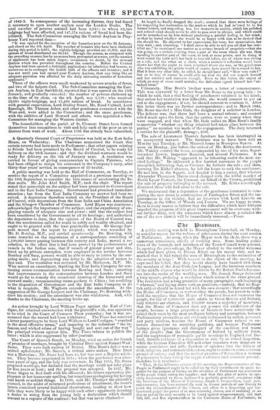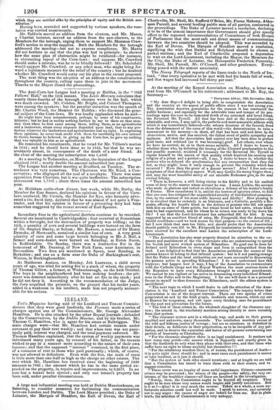Zbe tiro bintes.
A public meeting was held in Birmingham Town-hall, on Monday, to consider means for the redress of grievances during the next session of Parliament. At noon, when the Mayor took the chair, there was a numerous attendance, chiefly of working men. Some leading politi- cians of the borough and members of the Town-Council were present. In opening the proceedings, the Mayor alluded to the cordial welcome which had been given to Prince Albert on his recent visit, and re- marked that it had raised the men of Birmingham in the estimation of the country at large ! With respect to the object of the meeting, he expressed his belief, that they would shortly have banded with them the members of the Anti-Corn-law League, and the immense numbers of the middle classes who would be driven by Sir Robert Peel's Income- tax into the ranks of the working men. Mr. Joseph Stow delivered a long speech, prefacing a resolution which retraced the same ground. The resolution had a long preamble of many paragraphs, each beginning "whereas," and laying down various positions,—namely, that no Eng- lish subject should be taxed but with his own consent ; that accordingly the House of Commons, as representing the people, has power to with- hold the supplies ; that the House of Commons does not represent the people, for out of 6,000,000 male adults in Great Britain and Ireland, only 800,000 are electors, and 160,000 return a majority of members ; that the House of Commons does not possess the confidence of the people, because a large proportion of Members have notoriously ob- tained their seats by the most profligate bribery and corruption, because Parliamentary proceedings are obviously influenced by selfish, personal, and party motives, because the House of Commons refuses to en- tertain discussions on receiving petitions, and because Parliament betrays gross ignorance and disregard of the condition and wants of the people ; that the Government of Ireland by military force, and the suppression of peaceable public meetings in England and Ire- land, furnish evidence of a disposition to rule by an armed despotism, while the factions Education Bill and other measures were designed to coerce conscience and stifle freedom of opinion ; that the friends of civil, religious, and commercial freedom, ought to unite on some common ground of action ; and that the ancient practice of demanding a redress of grievances before voting the supplLs afforded such common ground : therefore be it resolved- " That, in the deliberate opinion of this meeting, the Representatives of the People in Parliament ought to be called on by their constituents to unite to- gether for the purpose of forcing on the attention of Parliament the grievances of the people before voting the supplies ; and that this plan of action be spe- cially recommended to them, because it is perfectly practical, consistent with the functions of the House of Commons, simple in its operation, legal, just, and necessary, has been successfully used in former periods of our history to resist the encroachments of the Crown, and offers to a despairing apd dis- heartened people the power of at once removing abuses, and of realizing at no distant period the only security to be found against misgovernment, and that full, fair, and free representation in the Commons House of Pirliathent, to
which they are entitled alike by the principles of equity and the British con- stitution.
Having been seconded and supported by various speakers, the reso- lution was carried unanimously.
Mr. Baldwin moved an address from the electors, and Mr. Mason, a Chartist lecturer' moved an address from the non-electors, to the Members for the borough, urging them to support Mr. Sharman Craw- ford's motion to stop the supplies. Both the Members for the borough addressed the meeting—but not to express compliance. Mr. Muntz did not hesitate to say that the plan was bad in principle : he showed how the same plan of obstruction might be retaliated—for instance, in obstructing repeal of the Corn-laws : and suppose Mr. Crawford should make a mistake, was he to be blindly followed ? Mr. Scholefield would support Mr. Crawford, or any other man, who might bring for- ward a legitimate measure for the relief of the country ; but he doubted whether Mr. Crawford would carry out his plan to the extent proposed.
The next thing was the adoption of an address to the constituencies throughout the country, calling upon them to join in the movement. Thanks to the Mayor closed the proceedings.
The Anti-Corn-law League had a meeting at Halifax, in the "Odd Fellows' Hall," on the 12th instant. The Leeds Mercury calculates that nearly three-fourths of the borough electors were in the hall, which was much crowded. Mr. Cobden, Mr. Bright, and Colonel Thompson, were among the speakers : but the peculiar attraction was the speech of Mr. Charles Wood, the Member for Halifax ; who discussed the gene- ral subject of the Corn-laws. He was loudly applauded when he said— He might have been misunderstood, perhaps, by some of his constituents, hitherto ; but he had in reality nothing further to say to them on that occa- sion than when he first came among them, telling them as an agriculturist and a landowner, whose every sixpence depended upon land, that to any pro- tection whatever the landowners and agriculturists had no right. In expressing these opinions, he never took credit with them for sacrificing his own interest to theirs, because he believed, in giving up the Corn-law, he gave up nothing that was valuable to him as an agriculturist. He reminded his constituents, that he voted for Mr. Villiers's motion in 1842 and he should have done so in 1843, but that he was un- avoidably absent, in consequence of the death of a near friend. At the close of the meeting the subscription was 1,430/.
At a meeting in Todmorden, on Monday, the deputation of the League obtained 5641.; nearly double the amount subscribed last year.
The League had another meeting at Bradford, on Tuesday. The at- tendance was very numerous. The Chairman was Mr. Rand, a Con- servative; who displayed all the zeal of a neophyte. There was some opposition from Chartists, but it was quite ineffective. The subscription announced was 1,7101.; about three times the amount subscribed last year.
At Efailsham cattle-show dinner, last week, while Mr. Darby, the Member for East Sussex, declared his opinions in favour of the Corn- laws unaltered, Mr. Curteis, the Member for Rye, who formerly advo- cated a 10s. fixed duty, declared that he was almost if not quite a Frep- trader, and that his opinion in favour of a protecting duty had ben
somewhat staggered by the recent avowal of Earl Spencer. u
Incendiary fires in the agricultural districts continue to be recorded. Several are mentioned in Cambridgeshire : four occurred at Somersham within a fortnight, but the destruction of property was trifling; on the 12th, a quantity of corn and several buildings were burned on the farm of Mr. Stephen Danby, at Soham ; Mr. Rawson, a tenant of Sir Henry Dymoke, of Horneastle, sustained a similar loss of corn. A very great quantity of corn and some large hovels belonging to Mr. J. Hall, a farmer and corn-dealer, were burned on Saturday, at Eaton Socon, in Bedfordshire On Sunday, there was a destructive fire in the homestead of Mr. Denning, of New Park Farm, near Axminster, in Devonshire. Two fires are mentioned at Speen, near Reading, in Berkshire ; and one on a farm near the Duke of Buckingham's seat, Wotton, in Buckinghamshire.
At Maidstone Assizes, on Monday, Job Laurence, a child seven years of age, was tried for setting fire to a stack of wheat, the property -of Thomas Gillow, a farmer, at Wednesborough, on the 24th October. The boys in the neighbourhood had been making bonfires ; the pri- soner was detected immediately after he had set fire to the stack ; and lie did not deny it. According to the recommendation of the Judge, the Jury acquitted the prisoner, on the ground that his tender years, added to a weakness in his intellect, made him not properly account- able for his actions.



























 Previous page
Previous page